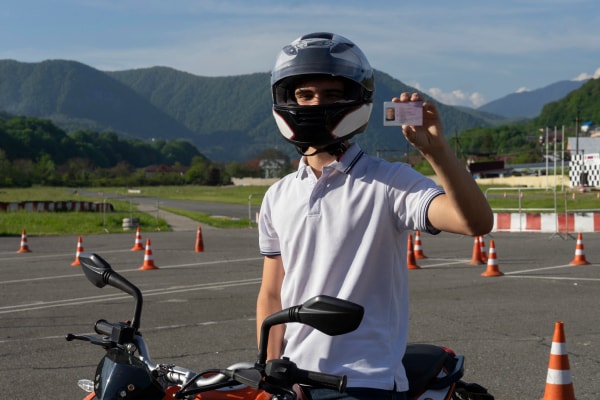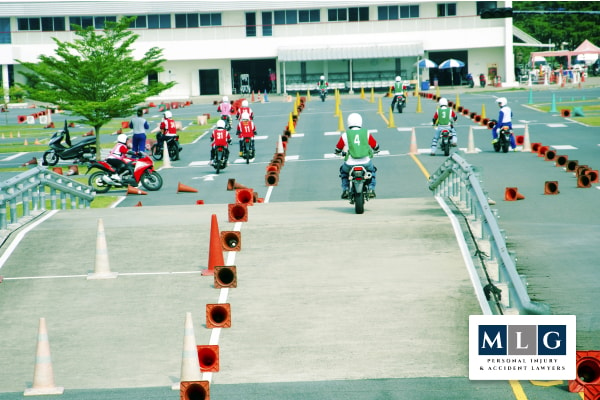
Getting a motorcycle license in California comes with specific rules. These include age requirements, safety training, and tests. Knowing these steps is crucial for anyone looking to ride legally. California law ensures that younger riders meet the necessary safety standards before they hit the road.
Marcereau Law Group help motorcycle riders stay informed about licensing and safety. Our team is devoted to helping injured riders recover after accidents. Knowing the rules and preparing for licensing is key to staying safe and avoiding legal trouble.
We will explain the age requirements for a motorcycle license, the steps to apply, and the restrictions for younger riders. We’ll also cover important safety tips and provide advice for preparing for your motorcycle skills test or written test.
In California, there are specific age requirements for getting a motorcycle license. Riders must meet certain conditions to ensure they are prepared to handle the responsibilities of riding. These rules are in place to promote safety and reduce the risk of accidents.
For younger riders, a motorcycle learner's permit is the first step. This permit allows individuals as young as 15½ years old to begin learning how to ride.
However, they must complete a driver education course and pass a written test to qualify. Riders under 21 must also complete a California Motorcyclist Safety Program (CMSP) motorcycle training course.
A full motorcycle license, or motorcycle endorsement, can be obtained at age 16. This requires meeting additional requirements, such as passing a motorcycle skills test or DMV evaluation. Following these steps ensures that new riders develop the necessary skills and knowledge.
In California, the minimum age to apply for a motorcycle learner's permit is 15½ years old. To qualify, applicants must complete a driver's education course and pass a written test. This permit allows young riders to practice riding while following specific restrictions.
For a full motorcycle license, riders must be at least 16 years old. They must complete all required training, including a motorcycle skills test or DMV evaluation. These age requirements are designed to ensure riders gain the necessary experience and knowledge to ride safely.
A motorcycle learner's permit and a full motorcycle license serve different purposes. The learner's permit is for practice and learning. It comes with restrictions to protect new riders and others on the road. For example, permit holders cannot ride at night, carry passengers, or operate on freeways.
In contrast, a full motorcycle license grants more freedom. It allows riders to ride without restrictions, provided they follow California motorcycle laws. To obtain a full license, riders must meet all requirements, such as passing a motorcycle skills test or completing a safety course.
Understanding the differences helps riders follow the law and prepare for safe riding. Both steps are essential for gaining confidence and improving skills on the road.

Obtaining a motorcycle license in California involves several steps. Each step ensures that riders are prepared to handle the responsibilities of riding safely. A few key requirements on how to meet them include:
Riders under 21 must complete a motorcycle training course, such as the CMSP. This course teaches essential skills, defensive riding techniques, and traffic safety. It also includes a motorcycle skills test as part of the training.
For riders 21 and older, completing the CMSP is optional. Instead, they can take the DMV’s motorcycle skills test to demonstrate their abilities. Both options ensure that riders are well-prepared for the challenges of the road.
Applicants must provide proper documentation to apply for a motorcycle learner's permit or license. This includes proof of identity, such as a valid driver's license, a birth certificate, or a passport. Applicants also need to show proof of residency, like utility bills or lease agreements.
The DMV requires this information to confirm that applicants meet California’s legal requirements. Without the proper documents, the application process cannot move forward. Ensuring you have everything ready can make the process faster and easier.
A vision exam is required to ensure riders can see well enough to drive safely. Applicants must also pass a written test that covers California motorcycle laws and safe riding practices.
The written test evaluates knowledge of traffic signs, signals, and defensive riding strategies. Preparing for the exam with study materials from the DMV increases the chances of passing. Both the vision and written tests are mandatory for obtaining a motorcycle learner's permit or license.
Younger riders face additional restrictions to ensure safety while learning to ride. These rules are designed to protect both the rider and others on the road.
Some of the main restrictions younger riders must follow when holding a motorcycle learner's permit are:
In California, younger riders may face restrictions on the size of the motorcycle they can operate. Riders under 18 often use motorcycles with smaller engines to reduce risks. Smaller engine sizes are easier to control and less likely to cause accidents.
These restrictions are especially important for inexperienced riders still learning to handle a motorcycle. Operating a powerful bike without the necessary experience increases the likelihood of losing control. Following these rules helps prevent many motorcycle crashes and improves overall road safety.
Regardless of age, California law requires all motorcycle riders to wear a helmet per CVC §27803. For younger riders, this is especially important as they are more likely to make mistakes while learning. Helmets reduce the risk of serious injuries or fatalities during a crash.
In addition to helmets, younger riders with a motorcycle learner's permit must wear protective clothing, such as gloves, boots, and jackets. These safety requirements minimize injuries in case of an accident. Adhering to these laws is important for avoiding citations and ensuring a safer riding experience.
Riders with a motorcycle learner's permit must follow specific supervision rules. For example, permit holders cannot carry passengers or ride on freeways. They are also restricted from riding at night when visibility is reduced.
These rules are in place to give new riders time to practice safely in less risky environments. Once the rider gains experience and passes the required tests, they can apply for a full motorcycle license with fewer restrictions.

Preparing for a motorcycle license requires practice, knowledge, and the right mindset. Following these tips can help you succeed:
The handbook provides essential information about motorcycle laws and road safety, which can be used to prepare for the written test.
These courses teach basic and advanced skills, including defensive riding and handling techniques. Completing a course can also waive the motorcycle skills test requirement for riders under 21.
Spend time riding in safe environments to build confidence. Focus on braking, turning, and maintaining balance.
Use protective clothing, gloves, and helmet to lessen the risk of injury while practicing.
Ensure you have a valid driver's license, proof of residency, and identification for the DMV application process.
Plan your motorcycle road test and written test well in advance to avoid delays.

Getting a motorcycle license is a big step, but accidents can still happen. If you’ve been injured in a crash, you need legal help. Marcereau Law Group provide guidance and support for injured riders. We also help clients stay informed about up-to-date information on motorcycle laws and safety.
Whether you’re riding with a motorcycle permit, a temporary license, or a full driver license, you deserve to feel safe on the road.
Contact us today for a free consultation. We’ll review your case, explain your options, and work to secure the best possible outcome. Let us handle the legal challenges so you can focus on recovery.
Schedule Your Free Consultation
"*" indicates required fields


"*" indicates required fields